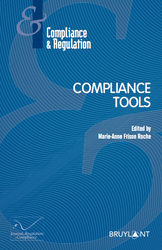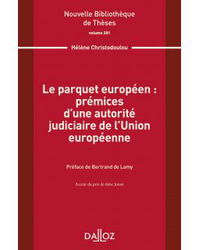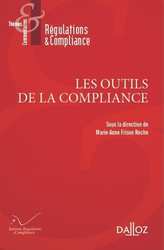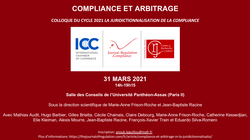Food for thoughts
June 21, 2021
Compliance: at the moment

► It is in its "Risk and Compliance" section that the Wall Street Journal, by its article of June 18, 2021 (➡️📝Europe's Chief Prosecutor Has 300 Cases on Her Plate Already), presents the first steps of the European Public Prosecutor’s Office, since June 1, 2021.
This inclusion presupposes that it is through a Compliance Law perspective that this new body must be understood, in order to understand and anticipate its action.
►In this perspective :
➡️📧Frison-Roche, M.-A., European Public Prosecutor's Office comes on stage: the company having itself become a private prosecutor, are we going towards an alliance of all prosecutors?, June 2, 2021
➡️ 💬Frison-Roche, « Le parquet européen est un apport considérable au Droit de la Compliance » (“The European Public Prosecutor's Office is a remarkable contribution to Compliance Law"), June 14, 2021
I. AN ACTION THAT WILL FOCUS ON FIGHTING THE MEANS USED TO DAMAGE THE FINANCIAL INTERESTS OF THE EUROPEAN UNION
The article of the Wall Street Journal takes the form of an interview with the European Prosecutor. Her responses also confirm the consubstantial link between European Public Prosecutor's Office and Compliance Law.
It is remarkable that she immediately says that she hopes the treatment of many cases, especially on healthcare and infrastructure sectors: "Our expectation is to have more cases, especially in the healthcare system, in public procurement, infrastructure, and also in agriculture ".
However, the 2017 European Regulation which established the European Public Prosecutor’s Office said that its "mandate" is to prosecute offenses affecting the "financial interests of the European Union", without being hampered by the cumbersome procedures for cooperation between States while these offenses are most often cross-border.
But one could think that, knowingly taking the means (corruption, money laundering) for the goal, the European Public Prosecutor's Office would immediately pursue not only the defense of the financial interests of the Union (admittedly financial interests damaged by corruption or money laundering) but these facts themselves: thus the European Public Prosecutor's Office works with the European Supervisory Authorities, in particular banking and financial authorities, which fight in Ex Ante against these offenses and prevent them.
II. AN ACTION THAT FOCUSES ON SECTORS NOT LEGALLY REGULATED IN EX ANTE BY SECTORAL REGULATORY AUTHORITIES
Moreover, it will be noted that the European Prosecutor is targeting three economic sectors which are not "regulated sectors" in the legal sense of the qualification, that is to say not monitored by a sectoral Regulatory and/or Supervision Authority: Health, Infrastructure and Agriculture.
Thus, the power of Regulatory Law, which relies in its Ex Ante, and its weakness, which derives from the pre-required existence of a sectoral Authority, is compensated: the action of the Public Prosecutor's Office is not limited to legally regulated sectors.
While Competition Authorities are mandated (➡️📅La concurrence dans tous ses états, June 25 and 26, 2021) to protect the competitive functioning of the markets, a Public Prosecutor's Office can deal with any infringement without having to determine a market.
For instance, Infrastructures don't constitute pertinent markets but can constitute fields for criminal activities, such as corruption or money laundering, justifying Compliance Law mechanisms.
What the new European Prosecutor is aiming for, namely Health, Infrastructures and Agriculture, have undoubtedly been damaged both by the sole primacy of the Competition perspective and by a Criminal Law constrained by the difficult inter-State cooperation, even though they are not subject to a supranational Ex Ante Regulation.
The European Public Prosecutor's Office aims to directly improve this, through Entreprises acting in Health, Infrastructures and Agriculture.
_________
June 18, 2021
Compliance: at the moment

► Law is slow, but firm. By its judgment of June 15, 2021, Facebook , the European Union Court of Justice widely interprets the powers of National Authorities, since they serve the people protection in the digital space (➡️📝(CJEU, June 15, 2021, Facebook).
Law is slow. The reproach is so often made. But the bottom line is that, in the noise of changing regulations, it establishes clear and firm principles, letting everyone know what to stand for. The more the world is changing, the more Law is required.
When Law degenerates into regulations, then it is up to the Judge to make Law. "Supreme Courts" appear, de jure as in the United States, de facto as in the European Union by the Court of Justice of the European Union which lays down the principles, before everyone else, as it did for the "right to be forgotten" in 2014 (➡️📝CJEU, Google Spain, May 13, 2014), and then with the impossibility of transferring data to third countries without the consent of the people concerned (➡️📝CJEU, Schrems, October 6, 2015).
Facebook litigation is kind of a novel. The company knows that it is above all to the Courts that it speaks. In Europe, it is doing it behind the walls of the Irish legal space, from which it would like to be able not to leave before better dominating the global digital space, while national regulatory authorities want to take it to protect citizens.
There is therefore a technical question of "jurisdictional competence". The texts have provided for this, but Law is clumsy because it was designed for a world still anchored in the ground: the GDPR of 2016 therefore organizes cooperation between national regulatory authorities through a "one-stop-shop", forcing the authorities to relinquish jurisdiction so that the case is only handled by the "lead" National Authority. This avoids splintering and contradiction. But before the adoption of the GDPR, the Belgian data protection regulator had opened a procedure against Facebook concerning cookies. The "one-stop-shop" mechanism, introduced in 2016, is therefore only mentioned before the Brussels Court of Appeal, which is asked to relinquish jurisdiction in favor of the Irish Regulatory Authority, since the company has in Europe its head office in this country. The Court of Appeal referred to the CJEU for a preliminary ruling.
By its judgment of June 15, 2021 (➡️📝CJUE, Facebook, June 15, 2021), it follows the conclusions of its Advocate General and maintains the jurisdiction of the Belgian National Regulator because, even after the GDPR, the case still undergoes national treatment. In this decision, the most important is its reasoning and the principle adopted. The Court notes that the "one-stop-shop" rule is not absolute and that the national regulatory authority has the power to maintain its jurisdiction, in particular if cooperation between national authorities is difficult.
Even more, will it not one day have to adjust Law more radically? We need to consider the fact that the digital space is not bound by borders and that the ambition of "cross-border cooperation" is ill-suited. It is of course on this observation of inefficiency, consubstantial with the digital space, that the European Public Prosecutor's Office (EPPO) was designed and set up, which is not a cooperation, nor a "one-stop shop", but a body of the Union, acting locally for the Union, directly linked to Compliance concerns (➡️📝Frison-Roche, M.-A. "The European Public Prosecutor's Office is a considerable contribution to Compliance Law", 2021 and ., European Public Prosecutor's Office comes on stage: the company having itself become a private prosecutor, are we going towards an alliance of all prosecutors ?, 2021).
So that's what we should be inspired by.
June 2, 2021
Publications

Full Reference : Frison-Roche, M.-A..,Rights, primary and natural Compliance Tools, in Frison-Roche, M.-A. (ed.), Compliance Tools, series "Régulations & Compliance", Journal of Regulation & Compliance (JoRC) and Bruylant, 2021, p. 319-342
___
Article Summary: In the traditional conception of the architecture of the sectors regulated by Law, and in Compliance Law which extends the regulatory techniques, rights have little place. But this configuration no longer takes place; on the contrary, rights are at the center of Regulatory and Compliance systems, and will be more and more so. They are and will be the primary tools of Compliance Law because they constitute a very effective "tool" to ensure the entire functioning of a system whose goals are so difficult to achieve. Because every effort must be done to achieve these goals, the public authorities not only rely on the power of crucial operators, but also distribute prerogatives to people and organizations who, thus encouraged, activate the Compliance system and participate in the achievement of the "monumental goal". Rights can prove to be the most effective tools for actually achieving the goals set, so much so that they can be seen as "primary tools".
But it is pertinent to have more pretension and to conceive rights as the most "natural" tools of Compliance Law. Indeed because all the Monumental Goals by which Compliance Law is defined can be expressed by the protection of persons, that is to say to the effectiveness of their prerogatives, by a mirror effect between rights. given as tools by Law by to persons and rights which constitute the very goal of all Compliance Law, in particular the protection of all human beings, even if they are in a situation of great weakness, rights becoming a "natural tool" of Compliance Law.
We are only at the beginning of their deployment and it is undoubtedly on them that Digital space in which we now live would be regulated, so that we will not suffocated there and that it will constitute for people a civilized space.
____
Read the General Presentation of the book in which this article has been published
____
June 2, 2021
Publications

Full Reference: Frison-Roche, M.-A. (ed.), Compliance Tools, serie "Régulations & Compliance", Journal of Regulation & Compliance (JoRC) & Bruylant, 2021.
This book in English is the first title of this collection integrally dedicated to Compliance Law, in that it is the extension of Regulation Law.
Read the titles of this series in English co-published by Bruylant.
This collection in English is articulated with a collection co-published between the Journal of Regulation & Compliance and Dalloz.
Thus, in parallel, a book in French, Les Outils de la Compliance is published.
Read the titles of the series in French co-published with Dalloz.
This book is published after a cycle of colloquiums organised by the Journal of Regulation & Compliance (JoRC) and Partners Universities.
___
General Presentation of the collective book
The political dimension of Compliance Law lies in the goals it aims to achieve. To achieve them, the concern for these goals is internalized in "crucial operators", which may be obliged to concretize "monumental goals" set by public authorities. These public bodies control the Ex Ante reorganization that this implies for these companies and sanction Ex Post the possible inadequacy of the companies, which have become transparent to this end. The effectiveness and efficiency of this internalization, without which the statement of these goals is worth nothing, is based on the Compliance tools that are deployed.
These appear to be very diverse but their substantial unity (topic which will be the subject of a forthcoming book) makes it possible to study the tools put in place from a unique perspective, by not isolating them in a particular branch of Law, Criminal law or International Law for example, but by measuring what is common to them, notably Anticipation, Trust, Commitment, Responsibility, Incentive, and so on. If the Compliance tools vary, it is rather not only according to the sectors, finance and banking appearing then as the advanced point of the general Compliance Law, for example in environmental matters, but also according to the countries and the cultures. It is in fact about them that legal cultures seem to oppose.
The book aims to understand these "tools" by going beyond the description of each instrument, for which we already have many monographs, for analyzing them through the issues of Risks, required Expertises, Training. Sovereignty claims, Incentives, mechanical aptitude of Technologies. It is through these themes that are analyzed by the authors, experts in the field, what we always want to understand better: Compliance Programs, Whistle blowing, Mapping, Sanctions, Extraterritoriality, etc.
____
Read the summary of the book.
Read the foreword, summarizing all the contributions.
Présentation of the book contributions:
-
Amico, Th., Compliance or the passage from ex post to ex ante: A Copernican revolution for the criminal lawyer?
-
Banck, A., The maturity of the Compliance tool’s user, first criterion of the choice of the salient tool
- Burlingame, Coppens R., Power, N, Lee, D.H., Anti-Corruption Compliance: Global Dimension of Enforcement and Risk Management
-
Calandri, L., Incentive(s) and Self-Regulation(s): which place for Compliance Law in the Audiovisual Sector?
-
Causse, H., Compliance Training: Through and Beyond Traditional Legal Training
- Frison-Roche, M.-A., Describing, designing and correlating Compliance Tools to have a better use of it
-
Frison-Roche, M.-A., Building by Law the Unicity of Compliance Tools from the Definition of Compliance Law by its "Monumental Goals"
- Frison-Roche, M.-A., Drawing up Risk Maps as an obligation and the paradox of the "Compliance risks"
- Frison-Roche, M.-A., Incentives and Compliance, a couple to propel
- Frison-Roche, M.-A., Resolving the contradiction between sanctions and incentives under the fire of Compliance Law
- Frison-Roche, M.-A., Rights, primary and natural Compliance tools
-
Frison-Roche, M.-A., Training: content and container of Compliance Law
-
Galland, M., The Regulator's Inspection of the Effectiveness of the Compliance Tools Implemented by the Company
- Granier, C., The Normative Originality of Compliance by Design
-
Guillaume, N., Compliance risk mapping: first insights of challenges, limits and good practices
-
Guttierez-Crespin, A., Audit of Compliance Systems
-
Koenigsberg, S. and Barrière, F., The Development of Attorney's Compliance Expertise
-
Larouer, M., The Manifestation of Incentives Mechanisms in French Compliance Law
-
Merabet, S., Morality by Design
-
Pailler, L., Technological Tools, Compliance by Design and GDPR: the Protection of Personal Data from Design
-
Racine, J.-B., Geographical dominance in the choice and the use of Compliance Tools. Introductory remarks
-
Rapp, L., Incentive Theory and Governance of Space Activities
-
Roda, J.-C., Compliance by design in antitrust: between innovation and illusion
-
Salah, M., Conception and Application of Compliance in Africa
-
Tardieu, H., Data Sovereignty and Compliance
-
Thouret, T., Training and Compliance, Two Correlated Information Transmission Tools
June 2, 2021
Editorial responsibilities : Direction of the collection Compliance & Regulation, JoRC and Bruylant

► Full Reference: Frison-Roche, M.-A. (ed.), Compliance Tools, series "Régulations & Compliance", Journal of Regulation & Compliance (JoRC) & Bruylant, 2021.
This book in English is the first title of this collection integrally dedicated to Compliance Law, in that it is the extension of Regulation Law.
____
📚 Read the titles of this series in English co-published by Bruylant.
📚 This collection in English is articulated with a collection co-published between the Journal of Regulation & Compliance and Dalloz.
📕Thus, in parallel, a book in French, Les Outils de la Compliance is published.
___
📅 This book is published after a cycle of colloquiums organised by the Journal of Regulation & Compliance (JoRC) and Partners Universities.
___
► General Presentation of the collective book: The political dimension of Compliance Law lies in the goals it aims to achieve. To achieve them, the concern for these goals is internalized in "crucial operators", which may be obliged to concretize "monumental goals" set by public authorities. These public bodies control the Ex Ante reorganization that this implies for these companies and sanction Ex Post the possible inadequacy of the companies, which have become transparent to this end. The effectiveness and efficiency of this internalization, without which the statement of these goals is worth nothing, is based on the Compliance tools that are deployed.
These appear to be very diverse but their substantial unity (topic which will be the subject of a forthcoming book) makes it possible to study the tools put in place from a unique perspective, by not isolating them in a particular branch of Law, Criminal law or International Law for example, but by measuring what is common to them, notably Anticipation, Trust, Commitment, Responsibility, Incentive, and so on. If the Compliance tools vary, it is rather not only according to the sectors, finance and banking appearing then as the advanced point of the general Compliance Law, for example in environmental matters, but also according to the countries and the cultures. It is in fact about them that legal cultures seem to oppose.
The book aims to understand these "tools" by going beyond the description of each instrument, for which we already have many monographs, for analyzing them through the issues of Risks, required Expertises, Training. Sovereignty claims, Incentives, mechanical aptitude of Technologies. It is through these themes that are analyzed by the authors, experts in the field, what we always want to understand better: Compliance Programs, Whistle blowing, Mapping, Sanctions, Extraterritoriality, etc.
____
Read the summary of the book.
Read the foreword, summarizing all the contributions.
Présentation of the book contributions:
📝Amico, Th., Compliance or the passage from ex post to ex ante: A Copernican revolution for the criminal lawyer?
📝Banck, A., The maturity of the Compliance tool’s user, first criterion of the choice of the salient tool
📝Burlingame, Coppens R., Power, N, Lee, D.H., Anti-Corruption Compliance: Global Dimension of Enforcement and Risk Management
📝Calandri, L., Incentive(s) and Self-Regulation(s): which place for Compliance Law in the Audiovisual Sector?
📝Causse, H., Compliance Training: Through and Beyond Traditional Legal Training
📝Frison-Roche, M.-A., Describing, designing and correlating Compliance Tools to have a better use of it
📝Frison-Roche, M.-A., Building by Law the Unicity of Compliance Tools from the Definition of Compliance Law by its "Monumental Goals"
📝Frison-Roche, M.-A., Drawing up Risk Maps as an obligation and the paradox of the "Compliance risks"
📝 Frison-Roche, M.-A., Incentives and Compliance, a couple to propel
📝 Frison-Roche, M.-A., Resolving the contradiction between sanctions and incentives under the fire of Compliance Law
📝 Frison-Roche, M.-A., Rights, primary and natural Compliance tools
📝 Frison-Roche, M.-A., Training: content and container of Compliance Law
📝 Galland, M., The Regulator's Inspection of the Effectiveness of the Compliance Tools Implemented by the Company
📝 Granier, C., The Normative Originality of Compliance by Design
📝 Guillaume, N., Compliance risk mapping: first insights of challenges, limits and good practices
📝Guttierez-Crespin, A., Audit of Compliance Systems
📝 Koenigsberg, S. and Barrière, F., The Development of Attorney's Compliance Expertise
📝 Larouer, M., The Manifestation of Incentives Mechanisms in French Compliance Law
📝 Merabet, S., Morality by Design
📝 Pailler, L., Technological Tools, Compliance by Design and GDPR: the Protection of Personal Data from Design
📝 Racine, J.-B., Geographical dominance in the choice and the use of Compliance Tools. Introductory remarks
📝Rapp, L., Incentive Theory and Governance of Space Activities
📝 Roda, J.-C., Compliance by design in antitrust: between innovation and illusion
📝 Salah, M., Conception and Application of Compliance in Africa
📝 Tardieu, H., Data Sovereignty and Compliance
📝 Thouret, T., Training and Compliance, Two Correlated Information Transmission Tools
June 2, 2021
Compliance: at the moment

► The European Public Prosecutor's Office (EPPO), a major weapon for the Compliance Law.
The European Union's prosecutor comes out of its cradle : the "European Public Prosecutor's Office" starts its activities. Long to set up, this European judicial body is linked to delegated prosecutors in the Member States. It is not a simple emanation of national bodies networked; of autonomous competence, it is the organ in the name of which the action is carried out.
In addition to this institutional revolution, there is a substantial revolution: this European Public Prosecutor's Office can prosecute any attack to the "financial interests of the European Union". These "attacks on financial interests" are conceived broadly, including in particular acts of corruption or embezzlement.
First of all, Didier Reynders emphasizes that this puts the rule of Law at the center. It is no longer Europe supporting actions to be coordinated between States, the national prosecution having technical difficulties to cooperate effectively with each other, but the European Public Prosecutor's Office which will allow unified and effective European action between delegated prosecutors.
Secondly, it continues the string of effectiveness between Compliance, located in Ex Ante, Compliance Law consisting in "preventing" and "detecting" such behavior, and the Ex Post, because a judge is sometimes necessary so that the disregard of these Ex Ante obligations is sometimes sanctioned (➡️📝Frison-Roche, M.-A., Compliance and International Public Order: the French conception preserved by the Paris Cour of Appeal, 2021) but also a prosecution: the prosecutor is a major figure in Compliance Law. Indeed, being able to prosecute, the prosecutor can also not prosecute and change its decision to close the file in returns for commitments (Ex Ante) from the company: the "public interest judicial agreements" - CJIP. In fact, through the opportunity to prosecute, will such powerful flexibility be found at European level?
Thirdly, the prospect of prosecution by the European Public Prosecutor's Office will incent in Ex Ante companies to prevent, or to prosecute themselves (➡️🎤Frison-Roche, M.-A. et Roda, J.-C. (dir.), The firm instituted prosecutor and judge of itself by Compliance Law, Lyon, June 23, 2021) the perpetrators of fraud in the interests of the Union European.
At a time when the Union is engaging in direct loans to lend still more, this role of the company, sometimes qualified as "private prosecutor", linked to a prosecutor, now European, is necessary.
Are we moving towards the alliance of all prosecutors?
June 1, 2021
Compliance: at the moment

May 29, 2021
Compliance: at the moment

May 26, 2021
Thesaurus : 09. Juridictions étrangères
► Référence complète : Rechtbank Den Haag (Tribunal de La Haye), 26 mai 2021, aff. C/09/571932 / HA ZA 19-379, Vereniging Milieudefensie et a. c/ Royal Dutch Shell PLC.
____
____
🏛️lire la traduction française du jugement
____
📝commentaires de la décision :
- D. 2021, pp. 1968-1970, obs. A.-M. Ilcheva
- EEI, nov. 2021, n° 11, comm. 86, note F.-G. Trébulle
- JSS, 14 août 2021, n° 59, p. 14, tribune C. Lepage, V. Saintaman et B. Denis
- Gaz. Pal., 27 juillet 2021, n° 28, p. 24, art. n° 424w6, note M.-P. Maître
________
May 11, 2021
Thesaurus : 05.1. CEDH
► Full reference: ECHR, 3rd sect., 11 May 2021, Halet c. Luxembourg, n° 21884/18.
____
____
► See the judgment of the Grand chamber of the 14th February 2023 which overrules this decision.
________
May 5, 2021
Thesaurus : 08. Juridictions du fond
Référence complète : Paris, 5 mai 2021, Carrefour
____
La société Carrefour Hypermarchés commande et achète des produits référencés par sa centrale de référencement, Carrefour Marchandises Internationales (CMI), notamment ceux de la la société I2C. Or, le responsable du référencement des produits de cette société s'était vu offrir des voyages par ce fournisseur (certes avant l'établissement de la Charte éthique).
Un audit avait révélé cela après l'adoption de la charte. Par conséquent, la société CMI a mis fin à sa relation commerciale avec ce fournisseur.
Contestée sur l'allégation du caractère brutal de la rupture des relations commerciale, la Cour estime que cela est justifié car la violation de la charte éthique pouvait fonder la rupture immédiate des relations commerciales, indépendamment de leur date en raison de leur gravité.
- Voir dans le même rattachement à l'obligation de vigilance sur les manquements du fournisseur, justifiant la cessation immédiate de toutes relations commerciales :
- Paris, 13 mars 2019, Monoprix , n°17/21477 ;
- Paris, 24 mars 201, Promod, n°19/15565
________
April 21, 2021
Thesaurus : Doctrine

► Référence complète : H. Christodoulou, Le parquet européen : prémices d'une autorité judiciaire de l'Union européenne, préf. B. de Lamy, Dalloz, coll. "Nouvelle Bibliothèque de Thèses", vol. 201, 2021, 518 p.
____
Lire la synthèse des propositions de l'étude
____
► Résumé de l'ouvrage (fait par l'auteure) : "La libre circulation des délinquants n'a jamais été accompagnée de l'ouverture des frontières aux autorités de poursuite d'Europe. Cette situation paradoxale, partiellement résolue par une coopération judiciaire étroite entre les États membres, semble insoutenable à l'aune des phénomènes criminels actuels. La mise en place d'un nouvel acteur s'est donc imposée. Concrètement, le parquet européen, en ce qu'il aurait des pouvoirs propres transcendant ceux des États membres, disposerait d'une compétence pour diriger des enquêtes et déclencher des poursuites sur le territoire de l'Union, pour lutter, au départ, contre les infractions portant atteinte aux intérêts financiers de l'Union européenne.
Après de multiples débats, le règlement lié à sa création, constituant le fruit d'un compromis délicat, a finalement été adopté le 12 octobre 2017. Dès lors, la mise en place d'une autorité de poursuite européenne ne relève plus d'un mythe, mais devient, en elle- même, une réalité empreinte de métamorphoses au sein de l'Union européenne. Cette dernière devrait influer tant sur les réactions des États membres que de l'Union elle-même, qui ne pourront rester inertes face à son apparition.
Cette imbrication de systèmes nationaux et européen a soulevé de nombreuses difficultés à la fois organiques et fonctionnelles qui ont été décryptées afin d'en comprendre les enjeux. L'étude du statut du parquet européen imposait de circonscrire corrélativement la notion d'autorité judiciaire au sein de l'Union européenne ; l'analyse de son fonctionnement supposait de déterminer les normes régissant son action et les organes de contrôle de ses prérogatives.
En définitive, cette étude invitera le lecteur à se questionner, plus largement, sur l'émergence d'une véritable justice pénale de l'Union européenne.".
________
April 21, 2021
Thesaurus : Doctrine

► Full Reference : Th. Amico, "La Compliance ou le passage de l'ex post à l'ex ante. Une révolution copernicienne pour l'avocat pénaliste ?" ("Compliance or the passage from ex post to ex ante: a Compernican revolution for the criminal lawyer?"), in M.-A. Frison-Roche (ed.), Les outils de la Compliance, coll. "Régulations & Compliance", Journal of Regulation & Compliance (JoRC) and Dalloz, 2021, p. 145-154.
____
📕read a general presentation of the book, Les outils de la Compliance, in which this article is published
____
► Summary of the article (done by the Journal of Regulation & Compliance): After referring to various definitions of Compliance Law, the author insists on the usefulness of the criminal lawyer in that he, familiar with the Ex-Post that constitutes the sanction, can be of good advice. in the Ex-Ante in which new compliance mechanisms are being developed, such as risk mapping or third-party assessment.
Addressing the punitive dimension of Compliance Law, the author shows that the criminal lawyer therefore naturally has a place there, whether it concerns the powers exercised by an administrative authority or the criminal law itself. In that he can "anticipate criminal proceedings", the criminal lawyer is therefore best able to ensure that the company does not expose itself to them, in particular in a good mastery of internal investigations, thus ruling out the criminal risk.
________
March 31, 2021
Thesaurus : Doctrine

► Full Reference: E. Kleiman, "The objectives of compliance confronted with the actors of arbitration", in M.-A. Frison-Roche (ed.), Compliance Jurisdictionalisation, Journal of Regulation & Compliance (JoRC) and Bruylant, coll. "Compliance & Regulation", to be published.
____
📘read a general presentation of the book, Compliance Jurisdictionalisation, in which this article is published
____
► Summary of the article (done by the Author): International arbitration, which remains the preferred method for the resolution of disputes arising from international commercial relations, has been overtaken by compliance, the manifestations of which are everywhere: arbitral institutions, arbitrators and courts exercising curial supervision of the international regularity of awards are regularly called upon to take into account rules of compliance.
Compliance has undeniably got a hold on the arbitration community. Being operators in an unregulated activity, arbitral institutions and arbitrators must generate trust; their ability to effectively self-regulate is a prerequisite for the success of arbitration and requires transparency and exemplarity. This self-imposed compliance is nowadays consubstantial to arbitration and is illustrated in such classic fields as prevention of conflicts of interest and control of arbitrators' availability, but also in the more recent domains of parity and diversity as well as reduction of the carbon footprint. Moreover, compliance has caught up with the ex post control of the international regularity of arbitral awards in matters involving allegations of corruption and money laundering. There is room for debate, particularly in France, because of the porosity of the boundaries between the methods that are specific to those mandatory rules of compliance that intend to prevent the most serious offences, and the methods that are specific to the establishment of the constituent elements of such crimes before criminal courts. This is an important issue, especially as the increasingly imperative nature of climate change and human rights regulations will extend the scope of these overlaps between compliance methods and the control of arbitral awards.
Arbitration is also taking over compliance. Arbitrators are called upon to rule on controversies arising from economic activities that are related to compliance: contracts relating to the implementation of preventive measures in the fields of anti-corruption, anti-money laundering and human rights as well as transactions relating to the reduction of the carbon footprint and climate change, etc. Moreover, compliance is also an arbitrable matter and arbitrators must apply or take into consideration the observance or disregard of rules of compliance when adjudicating commercial or investment disputes.
_____
🦉This article is available in full text to those registered for Professor Marie-Anne Frison-Roche's courses
________
March 31, 2021
Conferences

 Référence complète: Frison-Roche, M.-A.,Compliance et Arbitrage : un adossement, rapport de synthèse in Frison-Roche, M.-A. & Racine, J.-B. (dir.) Compliance et Arbitrage, Colloque coorganisé par le Journal of Regulation & Compliance (JoRC) et le Centre de recherches sur la Justice et le Règlement des Conflits (CRJ) de l'Université Panthéon-Assas (Paris II), avec le soutien de la Cour Internationale d'Arbitrage, Paris, 31 mars 2021.
Référence complète: Frison-Roche, M.-A.,Compliance et Arbitrage : un adossement, rapport de synthèse in Frison-Roche, M.-A. & Racine, J.-B. (dir.) Compliance et Arbitrage, Colloque coorganisé par le Journal of Regulation & Compliance (JoRC) et le Centre de recherches sur la Justice et le Règlement des Conflits (CRJ) de l'Université Panthéon-Assas (Paris II), avec le soutien de la Cour Internationale d'Arbitrage, Paris, 31 mars 2021.
____
🗓️ Lire le programme de ce colloque
____
✏️Le rapport de synthèse a été réalisé au fur et à mesure que se déroulait le colloque : se reporter aux notes prises durant le colloque.
____
Voir le rapport de synthèse en vidéo
Voir l'intégralité du colloque en vidéo.
___
📅 Ce colloque s'insère dans le cycle de colloques 2021 organisé par le Journal of Regulation & Compliance (JoRC) et ses partenaires autour de la Juridictionnalisation de la Compliance.
📕 Les interventions ont servi de première base à la réalisation d'un titre dans l'ouvrage dirigé par Marie-Anne Frison-Roche, dont la version française, La juridictionnalisation de la Compliance, est co-édité par le Journal of Regulation & Compliance (JoRC) et Dalloz.
📘 Elles ont été de la même façon la première base pour la version anglaise de l'ouvrage, Compliance Juridictionalisation, co-édité par le Journal of Regulation & Compliance (JoRC) et Bruylant.
_________
March 31, 2021
Thesaurus : Doctrine

► Full Reference: J.-B. Racine, "Compliance and arbitration. An attempt at problematisation", in M.-A. Frison-Roche (ed.), Compliance Jurisdictionalisation, Journal of Regulation & Compliance (JoRC) and Bruylant, coll. "Compliance & Regulation", to be published.
____
📘read a general presentation of the book, Compliance Jurisdictionalisation, in which this article is published
____
► The summary below describes an article that follows an intervention in the scientific manifestation Compliance et Arbitrage, co-organised by the Journal of Regulation & Compliance (JoRC) and the University Panthéon-Assas (Paris II). This conference was designed by Marie-Anne Frison-Roche and Jean-Baptiste Racine, scientific co-directors, and took place in Paris II University on March 31, 2021.
In the book, the article will be published in Title II, devoted to: Compliance et Arbitrage.
____
► Summary of the article: Under the consideration of the "Compliance Jurisdictionalisation", it is necessary to study in the links between Compliance and Arbitration. The arbitrator is a judge, he is even the natural judge of international trade. Arbitration is therefore naturally intended to meet compliance which transforms the action of companies in an international context. However, the links between compliance and arbitration are not obvious. It is not a question of providing firm and definitive answers, but rather, and above all, of asking questions. We are at the start of reflection on this topic, which explains why there is, for the time being, little legal literature on the subject of the relationship between Compliance and Arbitration. It doesn't mean there aren't connections. Quite simply, these relations may not have come to light, or they are in the making. We should research the existing or potential bridges between two worlds that have long gravitated separately: Compliance on the one hand, Arbitration on the other. The central question is: is or can the arbitrator be a compliance judge, and, if so, how?
In any event, the Arbitrator is thus in contact with matters requiring the methods, tools and logic of Compliance. In addition to the prevention and suppression of corruption, three examples can be given.
- Arbitration has been facing economic sanctions (notably embargoes) for several years. The link with Compliance is obvious, insofar as texts providing for economic sanctions are often accompanied by compliance mechanisms, as in the United States. The arbitrator is concerned as to the fate he reserves in the treatment of the dispute with the measures of economic sanctions.
- Competition Law is a branch that came into contact with Arbitration from the end of the 1980s. The arbitrability of this type of dispute is now established and arbitrators apply it regularly. At the same time, Compliance has also entered Competition Law, admittedly more strongly in the United States than in France. The existence, absence or insufficiency of a compliance program aimed at preventing violations of the competition rules are thus circumstances which may assist the arbitrator in the assessment of anti-competitive behavior.
- Environmental Law is also concerned. There is environmental Compliance, for example with regard to the French law of March 27, 2017 on the duty of vigilance. Companies are thus responsible for participating in the protection of the environment, by internalizing these concerns in their internal and external operations (in their sphere of influence). As soon as an arbitrator is in charge for settling a dispute relating to Environmental Law, the question of the relationship to Compliance, from this angle, naturally arises.
It is therefore the multiple interactions between Compliance and Arbitration, actual or potential, which are thus open.
____
🦉This article is available in full text to those registered for Professor Marie-Anne Frison-Roche's courses
__________
March 29, 2021
Thesaurus : Soft Law
Référence compléte : Cukierman, C., A. et Bonnecarrère, Ph., Rapport du Sénat, La judiciarisation de la vie publique, 2022.
Mme Cécile CUKIERMAN, Rapporteur M. Philippe BONNECARRÈRE
____
March 24, 2021
Thesaurus : Tribunal constitutionnel allemand (Cour de Karlsruhe)
► Full Reference: Bundesverfassungsgericht (Deutsch Federal Constitutional Court), Order of the First Senate, March 24, 2021 (published on April 29, 2021), Nos. 1 BvR 2656/18, 1 BvR 78/20, 1 BvR 96/20
____
🏛️read the decision (in English)
____
🏛️read the press release (in English)
________
March 19, 2021
Thesaurus : 01. Conseil constitutionnel
► Référence complète : Conseil constitutionnel, 19 mars 2021, décision n° 2021-891 QPC, Association Générations futures et autres
____
____
________
March 17, 2021
Thesaurus : Soft Law
► Full Reference: D. Hever (ed.), Rapport sur les droits de la défense des personnes physiques dans l’enquête interne, March 2021.
____
📓read the report (in French)
________
March 2, 2021
Thesaurus : 08. Juridictions du fond
Full reference: Tribunal administratif de Paris (Paris administrative court), 4th section, 1st Chamber, Oxfam France, Notre Affaire à tous, Fondation pour la Nature et l’Homme et Greenpeace France, 3rd of February 2021, n°1904967, 1904968, 1904972, 1904976/4-1
Read the press release from Tribunal administratif de Paris (in French)
Feb. 23, 2021
Thesaurus : Doctrine
►Référence complète : Quentin B. et Voiron F., La victime dans la procédure de CJIP : entre strapontin et siège éjectable, AJ pénal, 2021, p.15 et s.
____
Feb. 2, 2021
Thesaurus : 05. CJCE - CJUE
Full reference: CJEU, 2nd of February 2021, DB v. Commissione Nazionale per le Società e la Borsa (Consob), case C‑481/19
Read the opinion of advocate general
Summary of the decision by CJEU:
"Natural persons who are subject to an administrative investigation for insider dealing have the right to remain silent when their answers might establish their liability for an offence that is punishable by administrative sanctions of a criminal nature, or their criminal liability".
To go further, read:
- Frison-Roche, M.-A., Resolve the contradiction between "incentive" and "sanction" under the fire of Compliance Law, 2021
- Frison-Roche, M.-A., Rights, primary and natural Compliance tools, 2021
Jan. 29, 2021
Thesaurus : Juridictions étrangères diverses
► Référence complète : Gerechtshof Den Haag (Cour d'appel de La Haye), 29 janvier 2021, aff. C/09/365498, HA ZA 10-1677 et C/09/33089, HA ZA 09-0579, Milieudefensie, Fidelis Ayoro Oguru, Alali Efanga. c/ Shell Petroleum N.V.
____
🏛️lire la décision (en anglais)
________
Updated: Jan. 14, 2021 (Initial publication: Dec. 14, 2020)
Conferences

► Full Reference : Frison-Roche, M.-A., The Economic Attractiveness of Impartiality ("L'attractivité économique de l'impartialité"), in ""Economic Attractiveness, Judge Office and Impartiality. Thinking the judge Office" ("L'attractivité économique, l'office du juge et l'impartialité. Penser l'office du juge"),
____
🎥 watch the conference (in French with English subtitles)
____
📝 read the colloquium program ( in French)
📝 see the general program of the cycle on the Judge Office.
____
📝 read François Ancel's article of 14th of January 2021 in the Receuil Dalloz and which report this colloquium (in French)
📝 read the Working Paper, basis of this conference.
This Working Paper is significantly different from the conference because it was conceived befor the colloquia cycle beginning. In addition, since this manifestation was a Round Table, the conference has taken more into account previous conferences and what said the other two speakers.
📊 see the slides, basis of the conference (in French)
The slides could not be shown during the conference. Orally, it was appropriate to more develop the introductory remarks for emphasizing the human and unique dimension of the Judge Office, expected in economic matters. As a result, the second part of the conference was not given orally, so slides therefore remain the only media available.
____
► Summary of the conference : To fit into the ambition of this general colloquia cycle, which is to "Think the Judge Office" and in this round table which apprehends the imperative of economic attractiveness of this office, firstly emerges the seemingly contradictory relationship between this imperative and the distance that the judge must maintain. Thus it is often asserted that the judge should be internalized at this point in the "places", - an economic concept of great scope (to which the first part of the introduction is devoted, defining the "place" at the same time as a closed and porous space and as a "systemic litigant" -, that he/she should ipso facto lose his/her distance, that is to say his/her impartiality. As places are in competition, even if weighing on one hand the effectiveness of the place, and on the other hand the impartiality of a judge who is external to this place - Judge referring to the Law , Impartiality would necessarily emerge weakened. It would then be necessary on a case-by-case basis to get the judge to give the desired concessions...
The conference aim is to take the opposite position and to state that the Place - in particular because they must be strongly distinguished from the Markets, of which they were the ancestors - require a Judge, who is at the same time "singular", that is to say with a personality, a face, opinions, and in distance so that his/her imagination does not surprise Place. Indeed, these require a human Justice, and a not mechanical one and singular judges, of whom the juge des référés or the arbitrator are the epigone, meets this need. But for reducing their "margins of discretion", how Economy qualifies the Impartiality of a person who can never be neutral, the singular Judge's Office must be inserted into mechanisms reducing these margins. In this way, the Place may reach a Judge who is always more impartial, and in doing so the Place becomes always more attractive.
To achieve this in practice, the place expresses two legitimate expectations, as a "systemic litigant", whose satisfaction increases and the singular Judge's Impartiality and increases the Attractiveness of the Place as a space. This clearly shows that the Place's Attractiveness and the Judge's Impartiality, because judges are inserted into procedures, into institutions and into a "jurisdictional family", are not only not contradictory, but are on the contrary convergent, one fueling the other.
Concretely, and judicial practice shows it, it is necessary to consolidate the particular Judge's Impartiality by inserting him/her into collective processes. As it is necessary to promote a radiance of Impartiality by strengthening the "jurisdictional family".
To consolidate the singular Judge's Impartiality by inserting him/her into collective processes, it is necessary to admit without hesitation the subjectivity of the judge, to seek it even. The reduction of the margins of discretion, definition of impartiality, being obtained by the inclusion of the judge in a procedure of which he /her alone is the master but in which he/her is not alone. This has the technical consequence that he/her is himself/herself in an adversarial debate, not only during the proceedings, but also before (in the media), inside the judgment (and the decision of the Criminal Chamber of 25 November 2020 is a model of that) and after the judgment. By that, the Judge shows that by his/her office he/she is in the future, as climate justice will show. In addition, to limit his/her margins of discretion, the singular judge must fit into a rational principle of coherence, vertical and horizontal. Vertical coherence, because he/she integrates what it is said and the technique of the "determining opinion" is to be encouraged, the singular judge having to avoid it only if he/she has "strong reasons" to do it. This is to follow this general rule Comply or Explain (which is the very opposite of blind obedience). Horizontal coherence, because the singular judge either sticks to what he/she said, estoppel also being a rule of logic. But above all, the institution must extract as much as possible from " institutional doctrines", by all means, of which the annual reports are an example.
To consolidate the singular Judge's Impartiality by strengthening the notion and reality of the "Jurisdictional Family", it is necessary to have of it a broader conception, which could lead to "guidelines" common to various jurisdictions, and a stronger one, by integrating those surrounding the judge to lead to judgment. In this, the procedure before the Court of Justice of the European Union, working on a common file, is a model. If this community were even stronger, the Judge Office would be even more useful than it is already in the digital space.
Thus, Judges who are always human, always diverse, always singular, who listen, consider and adjust to the situation, who within a Jurisdictional Family fit into an Institutional Doctrine which transcends and supports them but which they transform if there is a strong reason to do so, a reason always expressed said: this is the embodied Impartiality that makes an economic and financial Place attractive.
________